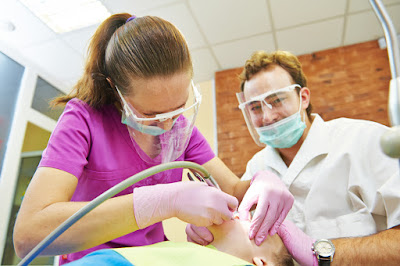With sedation, the dental specialist controls a medication amid the dental system. Only one type — general anesthesia — renders the patient unconscious. Alternate structures will relax you, however, won't knock you out entirely.
Numerous individuals fear the conventional dental methodology. People stress about the pain they may feel due to potential vulnerability and uneasiness. Sedation dentistry can enable patients to explore more casual dental work; however is it the correct decision for you?
 |
| Sedation Dentistry |
Popular Methods
Following are the most popular dental sedation methods:
- Nitrous oxide: A gas that relaxes you. It wears off rapidly so your dental specialist may give you a chance to drive yourself home after the appointment.
- Oral narcotics: Oral tranquilizers, for example, diazepam, additionally helps to relax patients while experiencing any dental emergency. It is commonly used around an hour or so before an appointment. The result of this sedation is that an individual is entirely conscious but less anxious, and may feel sleepy to the point that it wears off.
- Intravenous narcotics: Intravenous or IV sedatives can place you in varying phases of consciousness; This is otherwise called general anesthesia and, as said above, will place you into a profound sleep to the point that it wears off. While on this sedation an individual is less mindful of their environment, one may feel lethargic, and won't recall significant parts of the procedure once finished.
A few patients assume that general anesthesia offers the best solution. It additionally accompanies more potential symptoms than alternate strategies, so you should think about a lesser type of sedation dentistry.
You may favor dental sedation or rest dentistry, however, converse with your dentist about it first. Specify any unfavorably susceptible responses you've encountered previously, particularly to anesthesia so your dental expert can make adequate suggestions.
Moreover, you can talk about local anesthetics. These medications numb your mouth amid a dental technique, so you don't experience pain. Dentists usually administer local anesthetics with a short needle in a few places along the gum line. On the other side, if you don't fear the dental practitioner, anesthetic might be the only thing you need.
How Does Sedation Dentistry Work?
The process relies upon the sort of sedation your dental practitioner picks. In case you're taking an oral narcotic, then your dental practitioner will think of a remedy for the medication and give you guidelines on the best way to make it. For whatever length of time that you take after those instructions, you'll benefit from reduced anxiety and increased relaxation. Once the solution starts to work, you should begin to feel drowsy.
You don't need to get ready at all for nitrous oxide. Your dental practitioner will supply it before, during, and directly after the procedure. If you choose IV sedation, you may need to plan.
For example, your dental practitioner may request that you fast "not eat or drink anything," for a few hours before the procedure is initiated. You may likewise need to abstain from taking certain meds the day before you visit the dental practitioner since they can interfere with the sedation medicine.
Who Needs Sedation Dentistry?
Patients who consider sedation dentistry frequently have distinctive explanations for their interest, for example:
- Fear related to dental techniques
- Awful involvement with dental work before
- Delicate oral nerves
- A little mouth that winds up sore amid dental work
- Protection from nearby soporific
- General uneasiness issue
If you perceive yourself in any of those zones, think about getting some information about sedation dentistry. Dental sedation can enable patients to get past numerous sorts of dental work, for example, root canals, tooth extractions, dental implantation. Notwithstanding, it's usually not offered for consistent dental cleanings, X-beams, and other routine care. Cases of extreme anxiety may be a viable reason for sedation during those procedures, though.
Will You Benefit From Sedation Dentistry?
Before you settle on dental sedation, consider the method you confront and your general reaction to dental care. For example, do you fear needles? Provided that this is true, IV sedation may cause more tension than the dental work itself. Thus, in case you're stressed over getting to be defenseless on the dental seat, you should need to remain alarmed.
In case you're putting off dental work since you fear the torment, or some other piece of the work, rest dentistry may offer the best arrangement. When you disregard issues, for example, dental caries, free or broken teeth, and different problems, you put your oral wellbeing in danger. Moreover, the problem may turn out to be more entangled over the long haul, which could imply that you'll require more extensive dental work later on.
Dr. Roman Fedorciw, a renowned Berlin Dentist, highly recommends visiting an experienced dentist on a regular basis to minimize dental issues.
Comments
Post a Comment